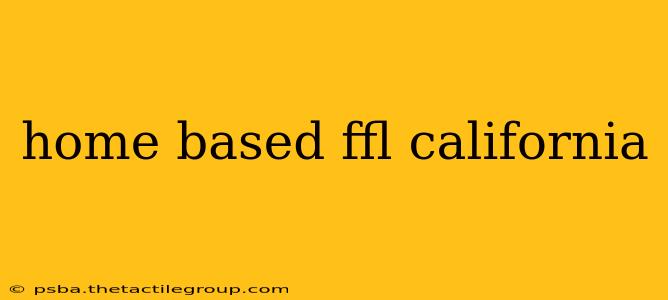California's regulations surrounding Federal Firearms Licenses (FFLs) for home-based businesses are complex and require careful navigation. This guide provides a detailed overview of the process, highlighting key requirements and potential challenges. Understanding these intricacies is crucial for anyone considering operating a home-based FFL in the Golden State.
Understanding California's FFL Restrictions
Unlike some states with more lenient rules, California imposes significant restrictions on where an FFL holder can conduct business, including operating from a home. The primary hurdle lies in complying with local ordinances and zoning regulations, which vary considerably across cities and counties. Before investing time and resources, it's essential to thoroughly research your local laws.
Key Considerations for a Home-Based FFL in California:
-
Zoning Compliance: This is paramount. Many cities prohibit businesses, including FFLs, from operating in residential zones. Contact your local city or county planning department to determine the permissible uses in your specific area. Don't assume; obtain written confirmation of compliance before proceeding.
-
Local Ordinances: Beyond zoning, specific ordinances might regulate business activities, storage of firearms, and security measures. These regulations often dictate signage, operating hours, and even the number of customers allowed on the premises at any given time.
-
Security Requirements: California's stringent gun safety laws extend to FFL holders. You must adhere to strict security protocols for storing firearms, including secure gun safes and potentially alarm systems. These requirements often exceed those mandated by federal regulations.
-
Insurance: Obtaining appropriate liability insurance is crucial to mitigate potential risks associated with firearms handling and storage. Standard business insurance policies might not suffice; you'll likely need specialized coverage for firearms-related activities.
-
State and Federal Regulations: Remember that compliance extends beyond local ordinances. You must fully adhere to both state and federal laws regarding FFL operations, including record-keeping, background checks, and transfer procedures. Any violation can lead to severe penalties, including license revocation.
The Application Process: A Step-by-Step Overview
While the specifics are handled through the federal Bureau of Alcohol, Tobacco, Firearms and Explosives (ATF), navigating California's local requirements adds significant complexity.
-
Local Zoning and Ordinance Research: Begin by contacting your local authorities to verify zoning compliance and understand any applicable ordinances. This is the first, and arguably most crucial, step.
-
ATF Application: Once local compliance is confirmed, you can proceed with the ATF's FFL application process. This involves extensive paperwork, background checks, and a detailed description of your business operations.
-
State-Specific Requirements: California may have additional state-level requirements that must be met alongside federal regulations. Consult the California Department of Justice (DOJ) website for updated information.
-
Security Measures Implementation: Before your license is issued, you'll need to demonstrate that you've implemented the necessary security measures to comply with both federal and state regulations.
-
Business Plan: A well-defined business plan outlining your operations, security protocols, and compliance measures is beneficial in the application process and for overall business success.
Challenges and Considerations
Operating a home-based FFL in California presents unique challenges:
-
Limited Space: Home-based businesses naturally have limited space, which can impact inventory and customer flow.
-
Neighborhood Concerns: Operating a firearms business from a residential area might raise concerns among neighbors. Open communication and proactive engagement with the community can help address potential issues.
-
Increased Liability: The potential for liability is significant. Thorough insurance coverage and adherence to all regulations are paramount.
Conclusion
Establishing a home-based FFL in California requires meticulous planning, extensive research, and absolute adherence to both federal and state regulations. The complexity of navigating local ordinances and ensuring compliance with stringent security standards cannot be overstated. Thorough preparation and a proactive approach are essential for success. Consult with legal and firearms experts to navigate this intricate process effectively. This guide provides a general overview and should not be considered legal advice; seeking professional counsel is strongly recommended.

